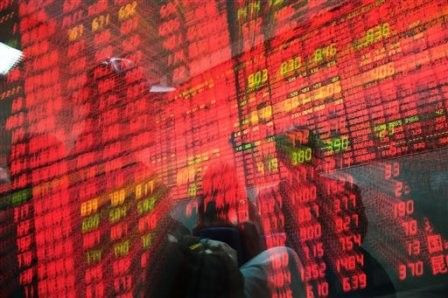Asian Stocks Struggle After Spain Downgrade

Asian stock markets ended lower Friday as renewed concerns about the debt-laden Eurozone offset better-than-expected US pending home sales data and corporate earnings.
The concerns over European debt crisis revived after Standard & Poor's downgraded Spain's rating by two notches to BBB+ from A with a negative outlook citing significant risks to Spanish economic growth and budgetary performance. S&P also lowered the short-term sovereign credit rating to 'A-2′ from 'A-1.′
The Japanese benchmark Nikkei declined 0.43 percent or 40.94 points to 9,520.89, Hong Kong's Hang Seng fell 0.33 percent or 68.26 points to 20,741.45 and while Chinese Shanghai declined 0.35 percent, Indian Benchmark BSE Sensex ended flat.
Earlier, stocks opened on a positive note, following overnight gains from Wall Street overnight on better-than-expected pending housing data. The National Association of Realtors' pending home sales index stood near a two year high in March, indicating signs of an improvement in the distressed US housing market.
Pending home sales, a forward-looking indicator that looks at contracts signed for existing homes, jumped 4.1 percent in March compared to the previous month and beat an expected increase of 1 percent from economists polled by Reuters. On annual basis, the index was up 12.8 percent and reached the highest level since April 2010.
Japanese benchmark Nikkei surged 1.3 percent after the Bank of Japan (BOJ) said Friday that it was further easing the monetary policy so that the economy could recover from deflation and grow more strongly. But the rally was short-lived and the benchmark index quickly slipped into the negative territory
The BOJ expanded its asset purchase program to 40 trillion yen ($494 billion) from 30 trillion yen in an attempt to achieve its 1 percent inflation goal. The current announcement of easing is the second in just over two months. However, analysts' say the second round of asset purchase in not likely to make much difference to either for Japan's currency or the economy.
We would not get too excited nor would we anticipate a renewed trend of JPY weakness. Unfortunately for the Japanese authorities, it is largely out of their power to engineer a lasting negative impact on the JPY unless they can push US Treasury yields sharply higher, said a note from Credit Agricole.
Shares of Nintendo Co. plunged 5.55 percent in Tokyo after posting its first annual loss in more than three decades. The company swung net loss of 43.20 billion yen for the fiscal year ended March 31, compared to net profit of 77.62 billion yen in the same period last year.
Samsung Electronics gained 2.54 percent in Seoul after announcing better-than-expected first quarter earnings on higher Galaxy Smartphone sales.
PetroChina Co, Ltd., the world's second-largest oil and gas firm, surged 3.01 percent in Hong Kong after reporting a $6.21 billion profit in the first quarter.
© Copyright IBTimes 2024. All rights reserved.



















